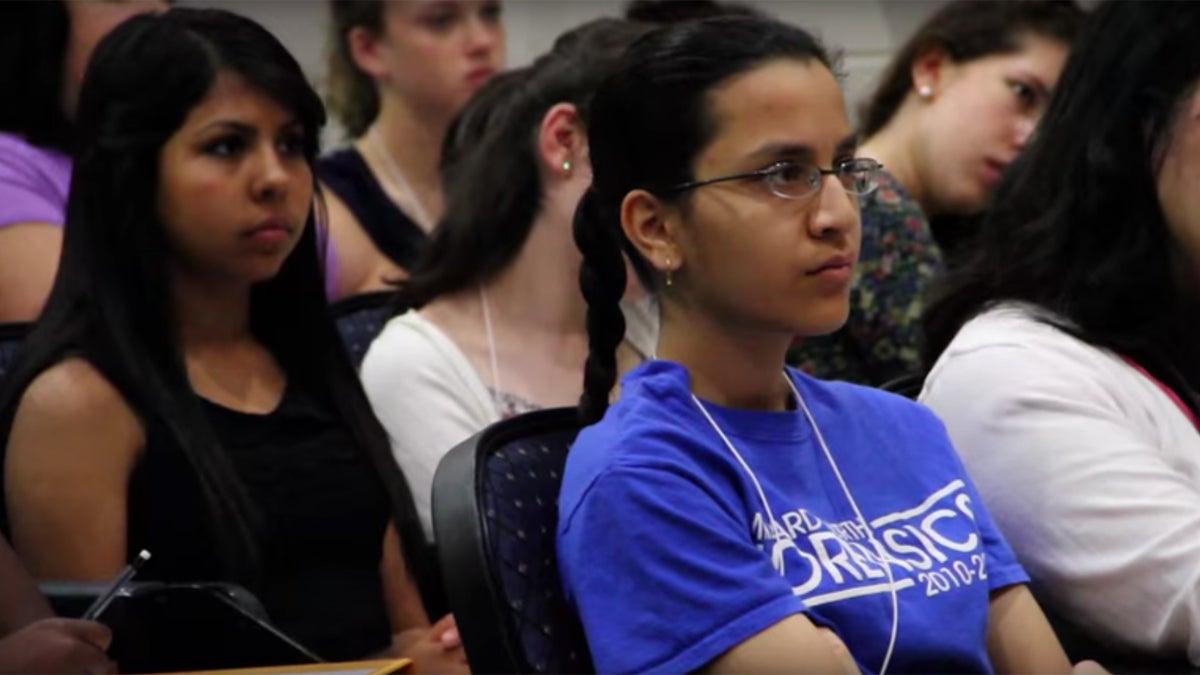We must get more young women interested in political leadership

A still image from the documentary 'Making Ms. President'
Heading into 2016, we still have a severe underrepresentation of women in politics. This lack of representation has an ongoing negative impact. The best way to get more women elected is to have more women in office to begin with.
I am a lifelong Pennsylvanian, and I spent the first 25 years of my life without being represented by a woman elected to legislative office. Even now, Rep. Donna Johnson Bullock, in Philadelphia’s 195th State House District, is the only woman who represents me. Joining her are the men who represent me in the Pennsylvania State Senate, both houses of the United States Congress, the governor’s office, and in the office of the president.
What makes this so sad is now common it is. Heading into 2016, we still have a severe underrepresentation of women in politics. Rutgers’ Center for American Women and Politics says that, in 2015, women held 19.4 percent of the seats in Congress and 24.7 percent of statewide elected executive offices nationally. Only 26.4 percent of state legislators in the entire nation are women.
This lack of representation has an ongoing negative impact. The best way to get more women elected is to have more women in office to begin with. Studies show that repeated exposure to female elected officials improves public opinion of women in leadership positions, leading to more women being elected to office. When young girls in particular see women in elected office and leadership positions, it increases their aspirations and educational attainment, and it increases their parents’ aspirations for them.
Women’s political achievement has become a popular discussion topic recently. With the possibility of the first woman president looming in under 10 months, mainstream publications in the U.S. are acknowledging openly that the issue is systemic — a crucial distinction from thinking of the disparity as a problem happening only in the present. Viewing underrepresentation in elected office as a long-term, deeply rooted issue, it becomes important to find solutions that address the immediate disparity and that focus on the source of the problem.
Fortunately the last several years have seen the birth of numerous organizations dedicated to getting women elected to office now, and well into the future. Some of these groups focus their efforts at the local level, such as 50-50 in 2020, a bipartisan organization established for the sole purpose of achieving political equality or women in Iowa. Others, such as WUFPAC (Women Under 40 Political Action Committee), a nonpartisan political action committee, endeavor to get young women elected to office, with a long-term vision of building seniority of women in Congress by electing them at a young age. Running Start, a Washington, D.C.-based non-profit offers leadership programs to young women in high school and college, cultivating skills such as public speaking, networking, and platform development, in hopes that their participants will find themselves empowered to pursue leadership roles — including those which lead them to public service. At the youngest ages, programs such as Girls on the Run focus on building confidence in elementary and middle-school girls. To quote the producer of the documentary “Raising Ms. President,” Kiley Lane Parker: “By instilling confidence in our young women and encouraging them to lead, we can change the face of politics for the betterment of all people and our country.”
When I see how many young women are served by these organizations, I’m hopeful that, by nurturing leadership skills and political interest from a young age, we can reach a point where the disparity is negligible. I’m hopeful that I will be represented by a woman in my state capitol, in Congress, or in the White House. Ultimately, I’m hopeful that young girls in Pennsylvania will grow up seeing and being represented by women at many levels of government long before they turn 25.
—
Meghan O’Connor is a member of Women of Fels at the Fels Institute of Government and the University of Pennsylvania.
Women of Fels is presenting a screening of “Raising Ms. President,” a documentary film about raising the next generation of female political leaders, at International House Philadelphia (3701 Chestnut Street), followed by a panel discussion, on Jan. 31., 4:30 p.m.
WHYY is your source for fact-based, in-depth journalism and information. As a nonprofit organization, we rely on financial support from readers like you. Please give today.

